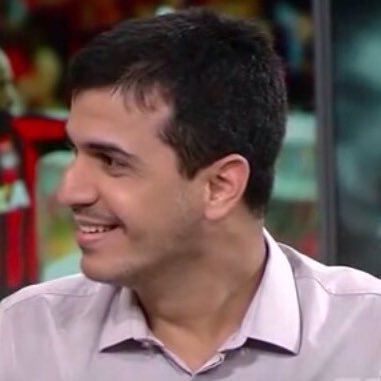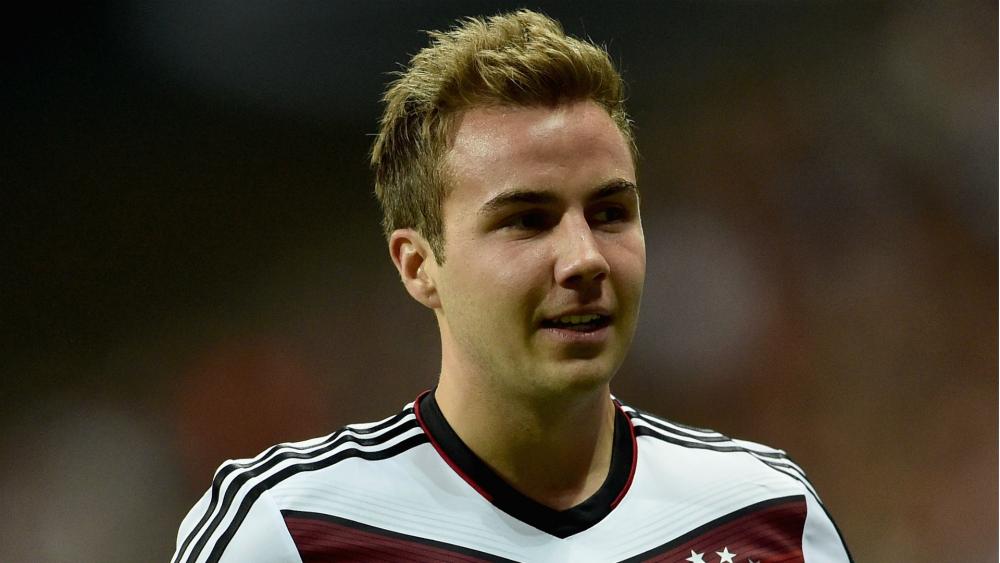Bruno Fernandes's remarkable story – the Manchester United star's rise, told by those who know him
A plucky disagreement with dad changed the course of his life forever, but such burning ambition has already made Bruno Fernandes a United hero. Taking in Italian escapades and lunacy in Lisbon, this is his remarkable story so far
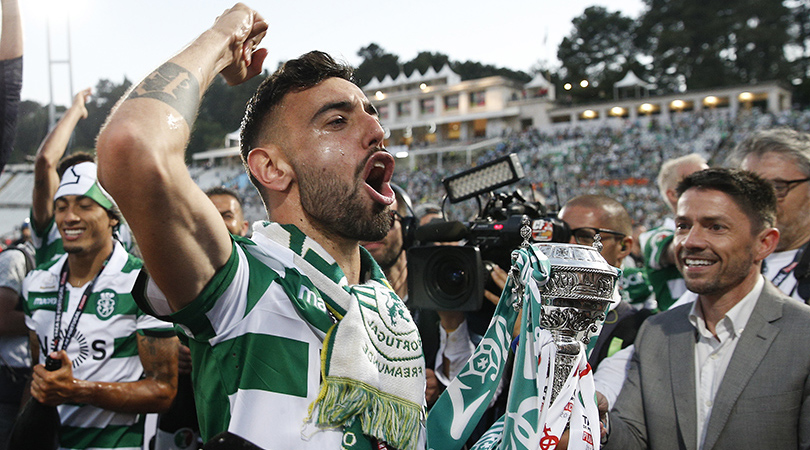
This feature originally appeared in the May 2020 feature of FourFourTwo magazine. Subscribe now and get FREE SoundMAGIC E11C earbuds worth £49.99
Portugal has been hit hard by a financial crisis over the past decade. Emigration has soared as a result, with in excess of two million citizens currently living abroad.
For five years, Jose Fernandes formed part of these statistics. Unemployed and struggling to provide for his family, he chose to leave home for Switzerland in search of a job. At first, the idea was to take his wife and three children with him, but a problem soon emerged: Bruno, his middle son, refused to go. Worse, he threatened to run away if they insisted on moving ahead with their plan.
Playing in the Boavista youth ranks at the time, a fledgling Bruno Fernandes was not willing to quit his local team. “In Switzerland, they don’t know how to play football,” he repeatedly told his parents.
Ultimately, his wish was granted. While Bruno’s dad, Jose, packed his bags for a new country, his mum, Virginia Borges, remained back in Gueifaes – a district on the outskirts of Maia, 15 minutes from Porto – to look on as he chased his footballing dream.
Much sooner than Virginia would ever have expected, that incredibly difficult decision paid off. Spotted by a scout from Italian side Novara during an under-19 fixture, Bruno received a tempting offer to leave his home in mid-2012. Unlike before, however, he was immediately keen. And so, at the age of 17, and after Novara and Boavista had agreed a €40,000 fee, it was his turn to hit the road.
When Bruno Fernandes went to Porto airport in August 2012, there were no camera crews waiting for him. No fans. No buzz whatsoever – just him and those he holds close. When he left Portugal in January 2020, the circumstances were very different. He wasn’t an unheralded teenager, but one of the most talked-about footballers in Europe, who had finally found his promised land at Sporting and recorded astonishing numbers over two and a half seasons: 63 goals and 48 assists in 135 games. He was a player so dominant that one of his team-mates, Macedonian Stefan Ristovski, once unceremoniously told him: “Please stay with us for next season – otherwise, we’re f**ked.”
Get FourFourTwo Newsletter
The best features, fun and footballing quizzes, straight to your inbox every week.
SEE ALSO Premier League live streams: How to watch every game on this week
In Lisbon, Fernandes enjoyed a particularly fruitful partnership with Dutch frontman Bas Dost, who moved to Eintracht Frankfurt in Germany last year. “He’s technically perfect,” Dost tells FourFourTwo. “Bruno has a brilliant first touch and an incredible shot on him – something I haven’t seen around that often.”
He’s right: Sporting fans hadn’t witnessed such an influential midfielder since Bulgarian legend Krasimir Balakov delighted the green half of Lisbon in the first half of the 1990s. Even Cristiano Ronaldo and Luis Figo can’t find a place in that discussion.
So, it wasn’t a shock that after a transfer saga which dragged on for several months, Fernandes’ arrival at Tires airport to board a private plane bound for Manchester was shown live on Portuguese TV. And that was just for his medical. But it was also a sign of how far the man from Maia had come.
“I’ve been in this business for a long time and I can assure you: Bruno Fernandes is the best player we’ve had in Portugal over the last few seasons,” explains former Sporting president Sousa Cintra. “And it’s important to stress this: he’s an even better person. He’s the kind of athlete who can only improve your team. He’s polite and determined. He brought a whole new dynamic into our dressing room, guiding his colleagues and encouraging them to run until the very last drop of sweat. He was to Sporting what Ronaldo was to Real Madrid: the complete package.”
It didn't take long for Manchester United fans to find this out for themselves. Having bedded himself in with February’s goalless draw against Wolves, Fernandes set about injecting some much-needed creativity into Ole Gunnar Solskjaer’s midfield with a goal or assist in each of his next four Premier League matches, culminating in the clever free-kick which teed up Anthony Martial to sink Manchester City in March’s derby victory. Little did he know then, that match would be United's last in the Premier League for three and a half months.
Almost immediately, Fernandes played a major role as United began to turn around a season that seemed lost. The 25-year-old’s impact hadn’t gone unnoticed in the stands: impressed supporters swiftly made a chant calling him their “Portuguese magnifico” and mentioning Ronaldo, his idolised forebear.
The No.18 has adjusted to life in England much faster than he might have anticipated – to the extent that in his first Manchester derby, Fernandes was sufficiently confident to put a finger on his lips in Pep Guardiola’s direction during a touchline row. You can’t say he doesn’t know how to work a crowd.
Solskjaer in particular was full of praise for the Portugal international. The Norwegian has described him as “a mix of Paul Scholes and Juan Sebastian Veron”, claimed “his brain is obviously quicker than many others” and hailed his “X-factor”.
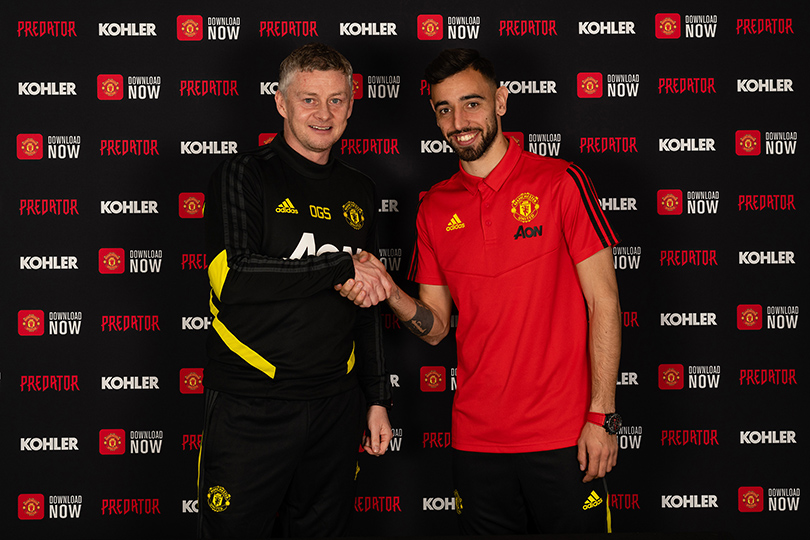
The initial fee of €55 million that United shelled out for the Portuguese string-puller looks like money well spent; some already believe him to be the club’s best signing of a difficult post-Fergie era. Admittedly, that’s a low bar to clear, but regardless: in his first months, Fernandes proved wrong those who worried that he couldn’t replicate his staggering efficiency in the Premier League.
Fernandes didn’t always have such a nose for goal. In his formative days he featured in defence rather than midfield, and although he was never really excited about the idea of becoming a centre-back, he has since recognised that the experience made him a wiser player. And for that, he is especially grateful to one man: Sergio Marques, to whom he sent a personal message after his unveiling as a Manchester United player.
Marques was his first football coach. They met when Fernandes was only seven years old and joined FC Infesta, a small outfit in Matosinhos near Porto.
“Bruno’s potential was there right from the very beginning,” Marques tells FFT today. “He was already gifted, but obviously needed some polishing. Our age group would train on Mondays, Wednesdays and Thursdays, and played on Saturdays. But you could see he was eager to learn more, so I asked him if he wanted to do one-on-one sessions and improve certain areas of his game.
“He said yes, so every Tuesday at around 6.30 in the evening, it was Bruno and me, working on his passing and ball control skills. Some may describe him now as a risk-taker, but I consider that trait to just be a strong belief in his own abilities.”
Fernandes’ promising displays for Infesta at a regional youth tournament attracted Porto, but instead he ended up joining rivals Boavista because they were offering minibus travel to and from their training complex.
Until the age of 15, Bruno played mostly as a centre-back. One morning, though, he called his coach aside and declared that he didn’t want to play in defence any more. He asked to instead be loaned out to Pasteleira, a neighbourhood satellite team. And it was there that fate suddenly smiled upon him.
“At the time, we were evaluating players – where they could produce more; which positions they should be playing – as we do at the start of every season,” remembers Pasteleira coach Antonio Peres. “If we’d had a No.10 in our team, maybe he wouldn’t have moved forward on the pitch. But we didn’t, and he took his chance. He was an instant hit – he scored in almost every game. As a captain, Bruno set the bar very high for others. He was always working on his own after training, taking free-kicks, doing shooting drills.”
Andre Gomes, now of Everton and formerly of Barcelona, was also around back then, but he is hardly remembered inside Boavista’s headquarters these days. Some claim that he didn’t have the same strong presence as fellow midfielder Fernandes, an outspoken gem whose long hair made him look like a rebel footballer.
“He was two or three years ahead of other kids,” says Abilio Novais, a former footballer who coached Fernandes at Boavista. “He was exceptionally mature for his age. Bruno had a tactical knowledge that shocked me and left me wondering, ‘Who is this boy?’ I still remember when we were playing Gil Vicente and had a problem with our centre-back at half-time. We needed someone to replace him, and Bruno immediately offered to fill in. He put in a superb performance.
“I honestly didn’t have much to teach him – he already knew a lot about the game. He may be just getting started as a player, but I have no doubt that if he wants to, he could be a top manager in the future. He already acts like one on the pitch.”
Brazilian Rodrigo Mann, a former Boavista team-mate who struggled with injuries and now plays for Prescot Cables in the Northern Premier League, isn’t at all shocked by his old colleague’s rise to superstardom.
“If you watched him on the pitch, it was so clear that he was a star in the making,” says right-back Mann. “Everybody wants to reach this level, of course, but he seemed to want it more. That is what made the difference for him, perhaps. He had a tireless work ethic, chasing every ball, demanding it, talking to the coach, and remonstrating with referees. He was really this intense.”

Father's Day 2020 gift ideas: six months of FourFourTwo for £20 + FREE power bank worth £29.95
His character was one of the things that stood out when Serie A strugglers Novara made their move. The northern Italy club’s budget was meagre but they sent their head of scouting, Mauro Borghetti, to Portugal for a first-hand look at Fernandes, who’d been recommended to Novara by his agent and brother-in-law, Miguel Pinho. Despite initial suspicion, they didn’t regret their decision.
“The first time I saw Fernandes in Portugal, I didn’t know anything about him,” Borghetti tells FFT. “He had been indicated to us, but apart from that, he was yet to be discovered.
“I went to see an under-19 match and he was one of only two boys born in 1994 – the rest were all older, from 1993. He didn’t put in a performance above expectations, but he showed personality and great technical skills. I suspect he probably knew someone had come to see him that day – in certain moments he worked extra hard. But it was undeniable that he had talent.
“That season, Novara were still competing in Serie A but we were about to be relegated to Serie B, so our goal was to bring in young players whose market value could potentially rise in the following campaign.”
Ultimately, they concluded that Fernandes ticked all those boxes. Having agreed a deal with Boavista, the Italians invited Bruno and his mum over to complete the transfer and show them around the city.
“Before leaving, his mother put €50 in his pocket in case he needed to buy anything there,” recalls Pasteleira coach Peres. “It was the most she could hand him at that point. But he still managed to get away with it – he’s a fighter.
“He’s also a boy who never had a Plan B in mind. For some time, he relied on rides from others like me to get to training and pursue a career, because his parents couldn’t drive. Bruno’s sole purpose was to give them some reasons to smile.”
From his humble background, Fernandes had watched his loved ones forced to leave their home in search of a brighter future. A while after his dad departed for Switzerland, his elder brother and role model, six years his senior, did the same. A lower-league player, Ricardo hung up his boots prematurely and flew the nest to work as a hospital assistant in England. Now Bruno was also moving on, but of his own accord.
Upon arriving in Italy in 2012, he couldn’t understand a word of Italian. And to make matters worse, Novara coach Attilio Tesser had forbidden his new players from speaking English to him during his first month.
But the midfielder, by then approaching his 18th birthday, managed to overcome his early struggles. He spent just three months with Novara’s U19s, as his displays quickly earned him a place in a first team who were ailing in lower-mid-table after a weak start to the campaign. Novara recovered to come 5th and reach the play-offs, however, and Fernandes – described as ‘the Maradona of Novara’ by local press – finished the season with 23 appearances, four senior goals, and burgeoning interest from big guns such as Juventus and Milan. “For us, he was certainly worth as much as Maradona,” says Borghetti with emphasis.
Fernandes was snapped up by Udinese in that summer of 2013. They lured him with a promise of regular football and a huge pay rise from his initial €1,500 monthly wage. He spent three years with Le Zebrette and developed a special bond with club legend Antonio Di Natale. Even that, though, didn’t spare the youngster a public dressing-down from the striker in 2015.
“He irritates me,” said Di Natale, “because he’s very young and has more ability than any of us – he’s got two incredible feet – but sometimes he drifts through games.”
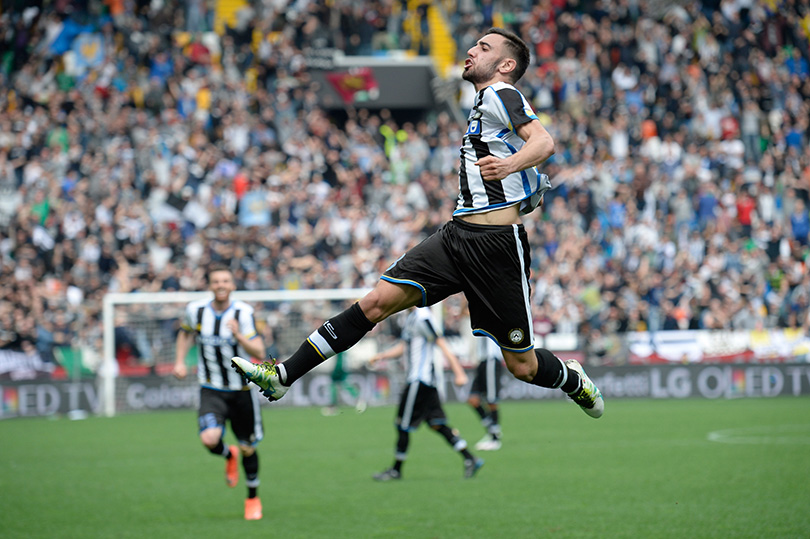
Di Natale demanded more from Fernandes. And Fernandes wanted more from Udinese. For that reason, he was on the move again in 2016 – this time to Sampdoria, where he was handed the No.10 jersey that had once been graced by Roberto Mancini. The club’s lack of ambition – specifically, a 10th-place finish in Serie A and no progression beyond the Coppa Italia last 16 – remained an issue, though, which prompted his decision to go home after a solitary season at the Stadio Luigi Ferraris.
At €8.5m, Fernandes became Sporting’s second-most expensive player of all time. He was named Primeira Liga Player of the Year in his debut season. But that promising start was disrupted by a group of 50 ultras who, frustrated by the team’s failure to qualify for the Champions League, broke into Sporting’s Alcochete training complex and attacked the squad with belts, fists and sticks in May 2018.
“I had never gone through something like this – I was afraid of what could happen to my family, and [after the attack] I asked my wife to take my daughter and rush to Porto,” said Fernandes in his testimony about the case, adding that he had even hired private security after the episode.
As a result, he was one of nine players who ripped up their contracts, before eventually agreeing to come back, refusing offers from England and Spain but doubling his salary in Lisbon. Such was his prestige, at the press conference to unveil his return, president Sousa Cintra – unaware that his microphone was on – was overheard offering his holiday home to Fernandes in case he fancied a few days on the Algarve’s beaches to unwind. He turned down the invitation.
While some supporters initially questioned Fernandes’ reasons for returning to the club, he responded with the most prolific season by a midfielder in European club history. An amazing 32 goals and 17 assists in 2018-19 beat the previous record, set by Fenerbahce’s Brazilian star Alex in 2010-11. His stats only began to illustrate his impact off the pitch, too, where he took on a more prominent role inside the dressing room.
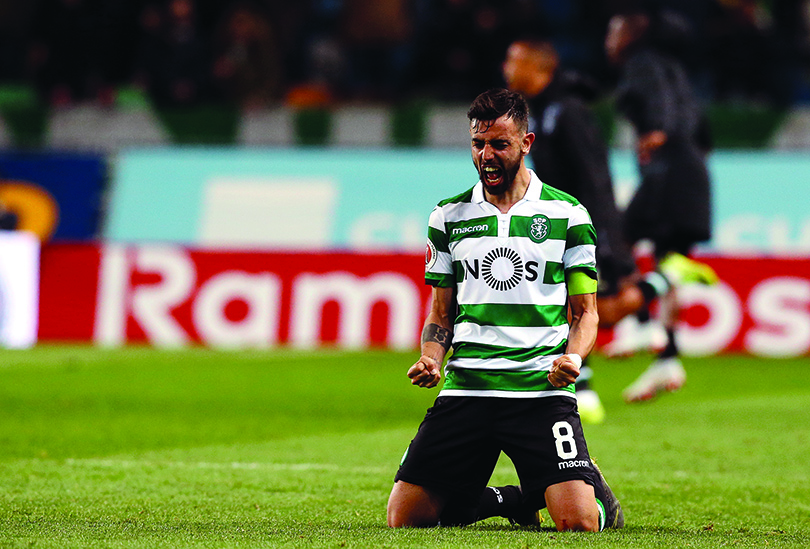
“He was already the captain in his second season there,” says striker Dost. “Although he was young, he had leadership qualities. He had good communication with the team and was always talking to the other players.”
Brazilian winger Raphinha agrees. “He had an absurd importance to all of us,” says the Rennes winger, one of Bruno’s best mates at Sporting. “Before I had even sealed my move from Vitoria de Guimaraes, he was already talking to me, giving me advice and recommending that I stay calm. He’s a born leader. After the way he welcomed me in Lisbon, he became a brother to me and I’ll be forever grateful.”
As it turns out, Bruno Fernandes is pretty good at welcoming himself to a new club.
And if he can keep it up, Manchester United supporters will be hailing him as much more than just their latest Portuguese magnifico.
NOW READ...
Premier League restart: 5 crucial matches you can't miss
Quiz! Can you name the last 50 Premier League Players of the Month?
Marcus Alves is a freelance journalist based in Lisbon and has written for FourFourTwo since 2012. He can also be found at BBC Sport, the Telegraph, Kicker and Yahoo. A former ESPN reporter, he covered 12 games in 15 days during the 2014 World Cup in Brazil, but can barely remember any of them. He blames cachaça for that.
